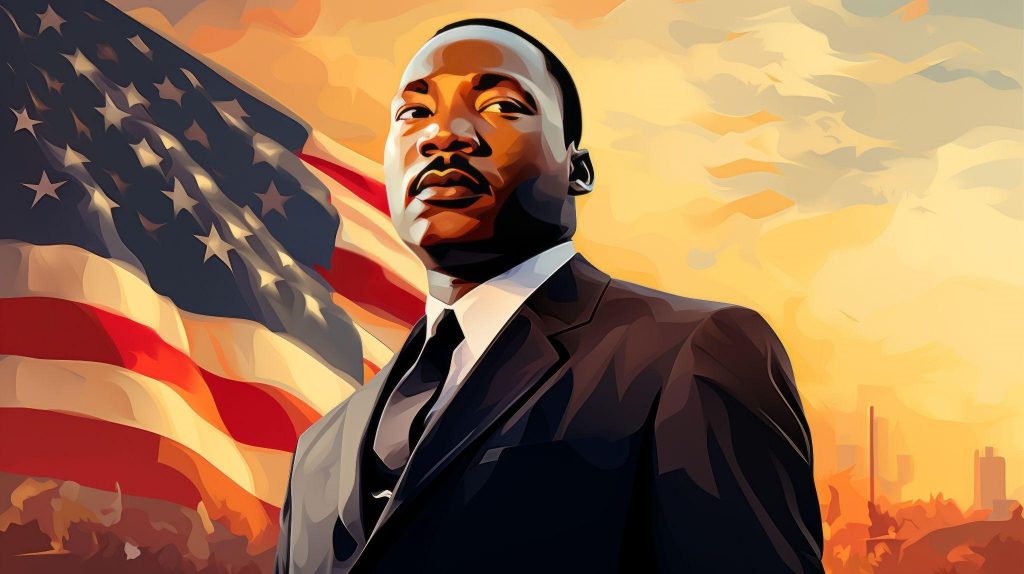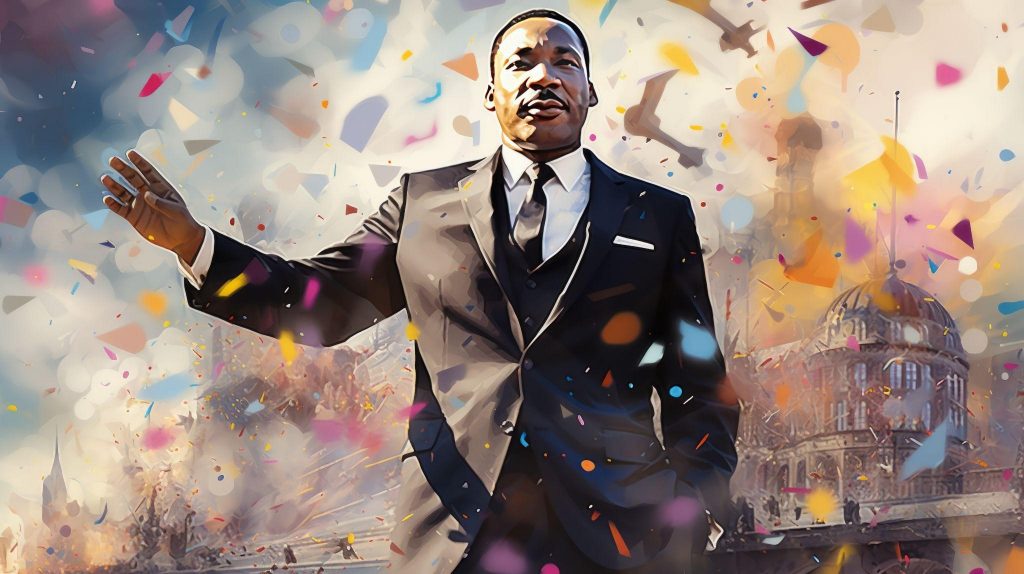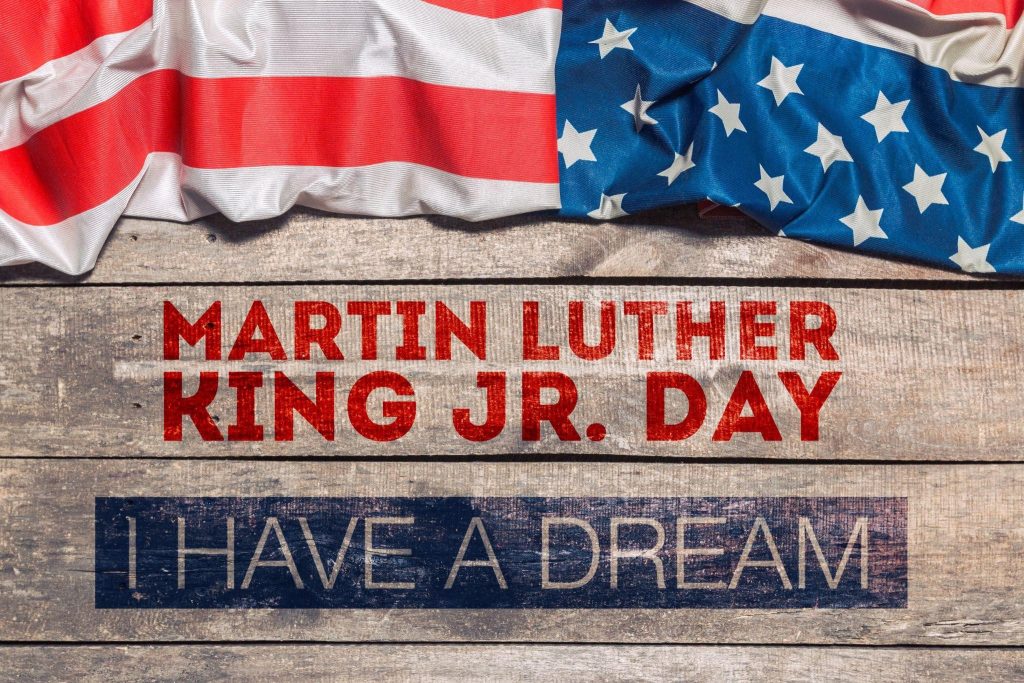THE WORLD’S #1 EXECUTIVE COACHING AND BUSINESS COACHING BLOG SINCE 2017.
The Enduring Legacy of Martin Luther King Jr: An Authentic Leadership Model
Published On: December 11, 2023 | Last updated on: March 12, 2025 | Author: John Mattone | Category: Blog, Intelligent Leadership
Martin Luther King Jr.’s leadership legacy is one of service, authenticity, and impactful communication. MLK’s civil rights efforts forwarded the cause of racial equality more effectively than anything before. Through his outstanding courage, vision, and commitment to values, he continues to inspire business leaders and leadership coaches to this day.
“Life’s most persistent and urgent question is: what are you doing for others?” – Martin Luther King Jr.
Martin Luther King Jr. led the American Civil Rights Movement from December 1955 to April 1968. Over these 12+ years, he and his allies forwarded racial equality more than it had progressed during the preceding 350.
MLK was a man of many inspirational words and even more inspirational deeds. Like Mahatma Gandhi, he eschewed violence in pursuit of his goals.
Martin Luther King Jr.’s leadership is a model of servant leadership. He understood the complexity of leadership and the interdependencies upon which effective leadership relies.
“I can never be what I ought to be until you are what you ought to be,” – he said, summing up his view of leadership and the significance of serving others.
Martin Luther King Jr.’s historical leadership is rife with lessons for today’s leaders and leadership coaching experts. In my leadership coaching books, I always advised young leaders to build reservoirs of positive leadership references, vicariously at first, then through their own experiences.
Historical leadership is a superb source of great leadership references, and Martin Luther King Jr.’s leadership stands out in this respect. Specifically, MLK’s life and leadership help leaders understand the three pillars of effective servant leadership: authenticity, character, and a continuous focus on personal growth.
These three basic leadership principles underpin my personal leadership and leadership coaching philosophies. I’m a firm believer in trust through genuine character and authenticity. And I know that only a steadfast focus on personal growth can motivate leaders to become better versions of themselves.
Understanding Martin Luther King Jr.
Born in January 1929, Martin Luther King Jr. was a Baptist minister who followed in his father’s footsteps of political and civil rights activism. His preferred methods to support his chosen causes were nonviolence and civil disobedience.
He has gone down in history as a champion of civil rights for people of color in the US. But he also took unequivocal stances on economic disparity, segregation, and anti-Semitism.
Having spent his childhood in the segregated South, he had his first taste of a racially integrated society in 1944, when he traveled to Simsbury, Connecticut, to work on a tobacco farm to help pay for his tuition at Morehouse College.
The Montgomery bus boycott of 1955 was the first act of civil disobedience he led. The result was the end of racial segregation on public buses in Montgomery, Alabama.
During and following the bus boycott, his prominence as the leader of the civil rights movement turned him into a target for those opposed to desegregation and racial equality.
Undeterred by bombings and knife attacks, he continued pursuing racial equality through the 1960 elections, the Albany Movement, and the 1968 Birmingham Campaign. In 1963, he led the March to Washington, where he delivered his “I Have a Dream” speech, the finest oratory masterpiece in US history.
MLK’s leadership was crisis leadership at its best. Constantly facing setbacks and physical threats, Dr. King persevered against the odds. He always sought to serve the community first and utmost. The knowledge that he was making a difference in something bigger than himself must have been a factor in his determination to succeed.
Some of the leadership traits he embodied were:
- The ability to inspire people through optimism and outstanding communication
- Resilience in the face of setbacks and adverse odds
- A deep-rooted desire to challenge and change the unfair status quo
- The willingness to face reality and tell the truth
- The ability to engage the hearts and minds of his followers
We can attribute a lot of what Dr. King achieved as a civil rights leader to his authenticity and leadership character.
Authenticity and Character
Like history’s greatest leaders, Dr. King observed strict and consistent values to which he would adhere under all circumstances. Such values were his unwavering commitment to justice and equality, as well as the principle that all individuals should be judged by their abilities and not the color of their skin.
MLK’s character and authenticity defined his leadership courage and commitment to nonviolent civil disobedience as his main weapons of activism.
His beliefs demanded personal sacrifices that he never hesitated to deliver. He knew that inclusivity and unity were keys to the success of the causes he championed.
In 1955, after he emerged as the leader of the Montgomery bus boycott, he became the target of hate and threats. Someone even bombed his house. Even while having to endure the constant presence of violence in his life, he never wavered in his commitment to nonviolent protests.
Dr King’s vision of justice went beyond the immediate goals of the civil rights movement.
In 1963, in his famous “I Have a Dream” speech, which he delivered on the steps of the Lincoln Memorial in Washington D.C., he made it clear that he was also committed to the economic and social empowerment of all Americans. To support this broad vision of justice and equality, he mobilized a diverse collection of supporters and allies.
People sense authenticity and dishonesty in their leaders. Leadership integrity through authenticity and a solid, reliable character is the only way leaders can build trust in their followers.
Trust is the indispensable prerequisite of respect, loyalty, and inspiration in the equation of effective leadership.
Personal Growth and Continuous Improvement
Continuous improvement and personal growth were integral parts of MLK’s leadership journey.
With his philosophy and even religious beliefs constantly evolving, he often engaged in self-reflection and educated himself proactively. In his “Letter from Birmingham Jail,” he reevaluated his stance on his leadership principles, committing himself even more deeply to nonviolence and social justice.
He constantly sought to learn from his experiences, using them to refine his strategies of nonviolent civil disobedience.
As a youngster, he excelled academically. He always valued education, seeking to shape and chisel his views through it.
A commitment to lifetime learning is essential for every successful servant leader. As a leadership coaching expert, I seek to inject my clients with an insatiable need for improvement and growth, boosting their motivation and empowering them to act to this end.
Lessons for Today’s Business Leaders
MLK’s leadership principles are as valid today as they were back in 1955. The beauty of solid, inspirational servant leadership is that, at its core, it’s timeless. Leaders may need to solve different problems in different contexts today, but the principles of leadership integrity can help them achieve their goals.
With the lessons historic leadership like MLK’s provides, all that’s left to do for a budding leader is to translate them to fit a modern business context.
Here are some actionable insights modern leaders can derive from MLK’s leadership:
- Effective communication is a leader’s superpower.
- People need well-defined long-term visions for inspiration.
- Leaders can only inspire people through authenticity.
- In addition to a long-term vision, effective leadership requires adherence and commitment to a set of well-delineated values.
- Leadership integrity and courage are powerful sources of inspiration for followers.
- It doesn’t hurt to be a master orator, but leaders can empower others through more mundane means, like investing in their skills and requesting input from them.
- By embracing social responsibility, leaders can endow their work with meaning that transcends their persons and organizations.
My work as a leadership coaching expert requires me to find creative ways to spark positive change in my clients. I found that applying the wisdom of historical leaders can help me achieve this objective.
Applying Martin Luther King’s Wisdom
Given the timeless validity of MLK’s leadership principles, applying his wisdom to modern leadership is relatively straightforward. To incorporate MLK’s “recipe of success” in their leadership, modern leaders can:
- Promote nonviolent communication and problem-solving.
- Stay true to their values and principles.
- Act with courage in alignment with their values.
- Be consistently authentic.
- Have a well-defined long-term vision.
- Focus on serving others.
- Empower people by creating growth opportunities.
- Create a culture of coaching and learning in their organizations.
- Value diverse perspectives and prevent the development of organizational silos.
The ambitions of servant leadership should go far beyond promoting individual success. By embarking on their authentic leadership journeys focusing on personal growth, and applying MLK’s leadership principles, leaders can create socially responsible organizations that benefit the communities to which they belong.
Conclusion
Martin Luther King Jr.’s leadership is an example of servant leadership focusing on inclusivity and meaningful social impact. There’s a reason why MLK is the only nonpresidential historical figure with a national holiday. His teachings transcend time and space, serving as a lasting inspiration for authentic, impactful leadership.
Leaders who want to make a significant long-term impact that exceeds their personas and organizations should embrace authenticity, courage, personal growth, and a strong leadership character.





